#it’s explicitly stated sarah at least has a different mother
Text
ok you guys. the pressure is on. here are the current fics in the works.
option 1 = “the sun was collapsing” -> angst
option 2 = “you can cut it” -> angst / comfort-ish
option 3 = “in the warm light” -> ANGST
option 4 = “hand to your heart” -> fluff? then ANGST
(more details in tags, kinda)
#heartpascal says#choose wisely yall#i should mention option 1 = joel’s child reader#though whether that’s adoptive or biological is never mentioned#essentially r is just already part of his family#sarah is r’s sister in that one#though again. not biologically#it’s explicitly stated sarah at least has a different mother#option 2 = paranoid reader who has been with joel for an unspecified amount of time#(just longer than ellie)#option 3 is genuinely angsty and kinda dark#at least what i had in mind when i staryed it#option 4 has the most potential for multiple parts i think#SO CHOOSE VERY WISELY#though i won’t promise i’ll write the one with the most votes#this is to try and motivate me tbh#but i will try and write as much as i can for the most voted one
33 notes
·
View notes
Text
Fixing "Boy Erased" (2018)
I recently decided to watch Boy Erased (2018) again, now that we're a couple years out from its initial release (and hype). And I came away with some thoughts.
First, something I think worked. You know that scene near the end, when Jared (Lucas Hedges) is trying to leave the conversion camp and he's racing through corridors and whatnot. That whole sequence works, but there's one moment that really stands out.
Jared attempts to get his phone and Michael (one of the 'camp counselors') tries to physically wrestle it away from him. There's a bit of a fight but eventually Jared makes his way to the bathroom and he calls his mom to come take him away. He then emerges from the bathroom and says to Victor Sykes (who runs the camp), "If you, or anyone else puts their hands on me, I have witnesses." Victor puts up his hands and says, "Nobody's gonna put their hands on you. Why would anybody do that? Come and sit. We're gonna wait for your mom, okay?" Then there's a hard cut to this:
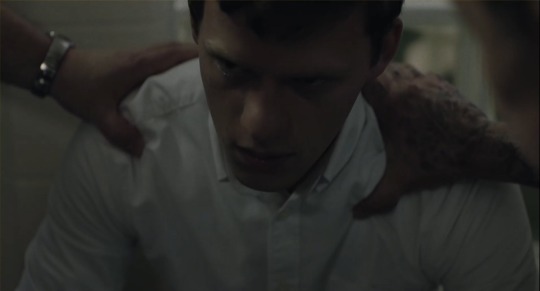
Victor Sykes and Brandon literally laying their hands on Jared and praying. And I love that juxtaposition because it brings to light the violence inherent in this situation. They're restraining him through enforced religious acts. There's violence in this prayer.
And on top of that, it serves as a pretty good metaphor for the whole film. Jared's parents (especially his mother) believe they're helping but really they're hurting. They can't see the violence of their actions in sending him to the camp.
If only the rest of the film was working on this level.
Problem the first: Audience as observer. The film is really about observing its subject, Jared, as he experiences these events. But it isn't about giving us any insight into his perspective or interiority as he does so. The camera is looking at Jared more often that it is revealing to us what he's seeing. Perhaps the most obvious example of this issue is with the perfume ad scene. Jared is on a run and he comes across a perfume ad on the side of a bus stop with a bare chested buff guy. The camera shows us the ad, and then the rest of the scene has the camera (and thus, the audience) placed some distance away as we see Jared first touch the ad, then throw a rock at the ad, and then scream "fuck you" at it repeatedly. The ad itself isn't salacious enough to illicit that kind of response in the average audience-goer, and the camera is so disconnected from Jared's experience that we aren't really gaining insight into why this ad is affecting him in such a strong way. It ends up making it so that scene really does not work.

This isn't to critique Lucas Hedges's performance in that scene. It's more to say that all the other elements of that scene make it feel ridiculous - because the audience has not been guided toward viewing that ad in the same way that Jared does in that moment.
The second problem: Casting. To be absolutely clear, this is not a knock against any of the actors performances. On the contrary, I think everyone was pretty dang exceptional. Rather, it's more a conversation about casting choices. Two of those choices really stand out as somewhat misguided: Xavier Dolan as Jon and Emily Hinkler as Lee.
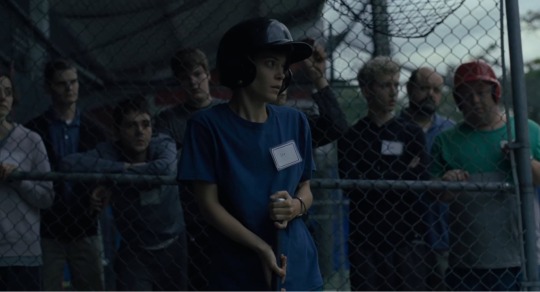
Turns out Emily Hinkler is a nonbinary actress. Lee (the character) is a cis guy who is conspicuously unmasculine. (If you've seen the movie - he's the one who gets hit in the head with a baseball). Casting a nonbinary actress as a cis boy at a conversion camp feels a bit off on it's own in that a conversion camp would be forcing people to adhere to assigned genders at birth. But I could get behind it as a sort of statement, like, a casting decision as direct opposition to the enforced gender binary of a conversion camp. i.e. Why should the movie adhere to the oppressive gender binary that the camp would? However, by casting a nonbinary actress as the least conventionally masculine character - it actually feels like it ends up reinforcing the binary. Lee's defining trait is that he's small and unmanly and, afaik, he's the only one of the male characters who is not portrayed by a cis man.
My issue with Xavier Dolan's casting is much simpler: Jon feels like he was written as a teenager and Xavier Dolan was approaching 30 when this was filmed. Maybe it wouldn't have bugged me so much if I didn't already know who Xavier Dolan was when watching the movie? Like, maybe if you watch it without knowing the actor's age, it works better? But also, the character feels like a teen but isn't explicitly stated to be a teen. So whenever he was on screen I kept wondering if actually part of Jon's situation is meant to be that he is 30 but stuck in a sort-of adolescence due to his relationship with his abusive father. Or did they just cast Xavier Dolan to portray a teenager?
This brings me to the third problem: Not enough of the ensemble. Jared, and thus the audience, spends proportionally, little screen time with the other people at the camp. They are rarely shown talking to each other - especially outside the restrictive observation of the camp's 'counselors.' This could be part of the point - i.e. that the camp is so isolating - but that isolation wasn't really highlighted by the camera/scenes/dialogue...so it really feels more like it's just an oversight. The movie focuses on Jared and his individual story and so the rest just fell by the wayside.

This is really unfortunate because there are some (potentially) great characters in there, especially Jon and Gary. Jon went through the program once before and is now back for a second time. We don't know what happened to make him come back. He appears to be 30-ish but he's staying at a hotel with his abusive father. He is completely invested in the program and treats his sexuality like an addiction. He has even taken it upon himself to forego all physical contact with other men (not even a handshake). His self-loathing is at once horrifying and heartbreaking.
In contrast, Gary (Troye Sivan) knows the entire program is bullshit, but he's playing along for his own survival. He's over 18; he lived with his boyfriend for a year prior to coming to the camp. So that begs the question of how his family convinced him to enter to the program. Also, Gary's so invested in his own survival, that he stays silent and is complacent in the abuse and violence he witnesses against others in the camp. He is both a victim and a bystander (at times).
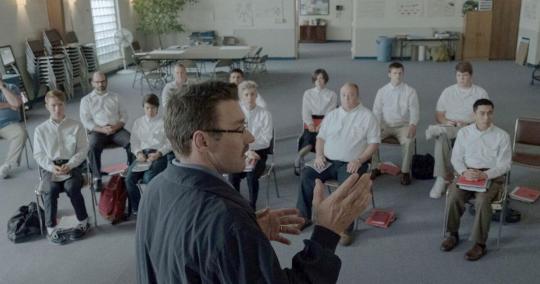
I think this film would've really benefited from spending more time with these characters (as well as Sarah, portrayed by Jesse LaTourette, and Cameron, portrayed by Britton Sear) in the camp and seeing how they all interacted with each other. Give us a sense of their different contexts and perspectives - and give us a better sense of the ways that conversion camps disempower the people sent there (even people like Gary, who knows it's bullshit). It's the thing that makes all the other movies about conversion camps work so well.
Which brings us to the fourth problem: the ending. If we spend more time with the ensemble, we'd either end up with a really long movie or we'd have to cut out something else. Well, folks, we can cut about 10 minutes off the end. Everything after the dinner Jared has with his mother post-escape can go. The climax of the film is when Jared finally decides to leave the camp. The resolution comes when his mother places herself in opposition to Jared's father (which she had never done before) and decides that she's going to take Jared home. And the emotional resolution comes when she admits to Jared that they made a mistake and that they harmed him by sending him to the camp.

Everything after that is extraneous. We don't really need to see Jared living in a city with a boyfriend, or see him begin to reconcile with his father. His relationship with his father was never the emotional core for the film. Boy Erased is, in some ways, a movie about self-actualization and that's the sort of movie that's best to end with something a bit open-ended. Y'know...a sort of end-that's-just-the-beginning kind of thing. Because the story of Jared falling in love and dating and moving out and gaining the self-confidence to confront his father - well that's a whole other movie. And here it gets shoved into the epilogue, which does the whole thing a real disservice.
Then there are the informational cards at the end. Two stick out as being particularly frustrating. One, "The real Victor Sykes left L.I.A. in 2008. He now lives in Texas, with his husband," feels irrelevant and unnecessary. The audience cares about what happened to Gerrard Conley (who wrote the story and whom Jared is based off of). But why do we care about what happened to the real guy who ran the camp? We don't...except for the jab about him now being married to a man - which feels like it's a more significant point for the cis straight people in the audience than for anyone queer. Turns-out-ex-gay-pastor-was-actually-just-gay-the-whole-time is not revelatory, I gotta say.
Then there's also this:

The emphasis about conversion therapy "practiced on minors," feels a bit disconnected from the film we just watched - which emphasized how abusive and traumatizing it is, even for adults. And in the U.S., all states currently legally allow conversion therapy for anyone 18+. Only Washington D.C. has banned it. And that, to me, is equally egregious, yet it isn't mentioned. The film itself challenges the notion that it's somehow okay for this to be practiced on adults because it's ostensibly their "choice," and then the info cards at the end shy away from that stance by focusing on kids.
I think the thing I find most frustrating about this movie, is the wasted potential. As I said at the beginning of this, there are some moments that really stand out in how they use the medium to convey meaning. There are some choices in how the film uses light and brightness (or lack thereof), that are pretty dang good, too. But ultimately, it's a film I feel so detached from and I think some of what I explained above is part of why.
#boy erased#lucas hedges#xavier dolan#emily hinkler#troye sivan#joel edgerton#nicole kidman#jesse latourette#britton sear
13 notes
·
View notes
Link
via Politics – FiveThirtyEight
Welcome to FiveThirtyEight’s weekly politics chat. The transcript below has been lightly edited.
sarahf(Sarah Frostenson, politics editor): In the latest issue of the New Yorker, reporter Jane Mayer suggests that Fox News has become a propaganda organ of the Trump administration, but who do you think really sets the agenda? Is President Trump influencing Fox or vice versa? And what does that mean for the state of journalism in the U.S., particularly in an era as politically polarized as ours?
Also welcome Jay Rosen, who is joining us today from New York University!
natesilver (Nate Silver, editor in chief): I suppose it’s a cop-out to say that it’s a symbiotic relationship? But I think Fox is following Trump’s lead — and the ratings he produces — more than the other way around.
One of the things I was wrongest about in the 2016 GOP primary was that once Fox went to war with Trump he’d have to back down (thinking of when Megyn Kelly asked him tough questions at that first debate, for example). But nope. He called their bluff.
That’s the short-term history, though. In the long term, Fox did an awful lot to lay the groundwork for Trump.
clare.malone (Clare Malone, senior political writer): Mayer points out this dynamic in the piece, about former chairman and CEO of Fox News Roger Ailes working with Fox to create the audience that would eventually come to love Trump. And in some ways, I think we have to concede that Trump was a member of that audience himself, before he ever ran.
jay.rosen (Jay Rosen, journalism professor at New York University): I think we should see it as a merger, in which it no longer makes sense to ask: Who is influencing whom? The two have become one. You do not have the necessary separation between the two to even say that Fox “covers” the Trump presidency since the Trump presidency is so frequently driven by what’s on Fox.
clare.malone: Maybe it’s a symbiotic merger … I think we can agree that Trump/Fox share a certain tabloid sensibility. That’s what really makes it all zing so well on TV.
sarahf: What was hard for me to grapple with in Mayer’s piece was how things at Fox have changed. To Clare’s point, Fox’s audience predates Trump and Fox News has long been a conservative outlet criticized for its right-leaning coverage coverage. So what’s really changed?
clare.malone:That’s an interesting question, Sarah. Mayer’s story does suggest that Ailes at least urged a valence of journalistic norms … that seems to have disappeared under the new leadership.
jay.rosen: This is the central problem in discussing Fox as a propaganda network. One way to answer that is that Ailes understood that it was in the long term interests of Fox News to preserve some independence or some space between itself and the political actors it promoted. Now that discipline is gone.
natesilver: If you’re a Weekly Standard (RIP) conservative, maybe you think that Trump does too much long-term damage to the cause of movement conservatism. But I don’t think the people running Fox News have never been those types of conservatives. They’ve always been attracted to the sensational, the conspiratorial and sometimes the slightly or not-so-slightly racist or xenophobic angle. They probably also want lower taxes and conservative Supreme Court justices. But if Trumpism is a bridge to get there — that’s more a feature than a bug for Fox News, especially since Trump is so good for ratings.
clare.malone: It’s basically the rise of New York Post conservatism over Wall Street Journal conservatism, I guess!
natesilver: I mostly agree, although the New York Post has a pragmatic streak on issues like gun control by virtue of being in New York, which Trump sort of had during the course of the campaign but has mostly given up since then.
Like, although it’s a subtle difference, I think Trump would be slightly more popular as a New York Post conservative than as a Fox News conservative.
But part of this is also that there’s not much of a market for the Weekly Standard/Wall Street Journal brand of conservatism. That was reflected in the failure of Marco Rubio’s campaign, for instance.
jay.rosen: Something that makes it hard to interpret the behavior of Fox News: For the most part, the people at Fox sneer at the legitimacy rituals of mainstream journalism. The network was founded on the rejection of those norms. But every once in a while they find the pressure too great and the situation “flips” into a conventional one, where the criticism is too great and they fire or reprimand someone, or pull back from a story. But it can be hard to predict when these normal rules take over, and when they will be rejected.
natesilver: Isn’t that a little bit like Trump himself? He will back down from a crisis, e.g. the government shutdown, at least occasionally. Every now and then — say, the State of the Union — he tries to exhibit some auspices of normality.
jay.rosen: Yes.
sarahf: But Fox does have some good reporters. I’m thinking about Chris Wallace here. So I don’t think they’ve entirely abandoned all journalism post-Ailes, even if they’re giving Sean Hannity a longer leash than they did, say, Glenn Beck.
natesilver: They do, yeah. Wallace is a very good reporter. Also, there’s Martha MacCallum. But as the New Yorker piece illustrated, their Trump boosterism is starting to impinge upon the journalistic parts of their operation.
clare.malone: I think we have to talk about the way that the public has no real sense of the separation between hard news reporters and opinion journalists at networks (and newspapers).
Journalists complain about that, but it’s not an intuitive distinction for a lot of people, i.e., Rachel Maddow is not a journalist, even if you like what she’s saying and even if she’s reporting tax returns (in a long and drawn out manner).
She has a point of view and I use MSNBC as an example because while they’re obviously different from Fox, they do very much have point of view in their journalism that can be difficult for viewers to separate out from their hard reporting.
jay.rosen: Disagree that if you have a point of view, you’re not a journalist. I wrote about it in greater detail here.
clare.malone: That’s not quite what I’m saying, Jay.
I think that shows where the host is first and foremost a personality — a Maddow, a Hannity — can have outsized effects on the way that the audience views the network as a whole.
natesilver: I’m with Jay on this, although I do think it’s interesting that Hannity has, at times, explicitly said he’s not a journalist — something you could never imagine Maddow saying.
I guess I think the whole opinion vs. newsroom distinction is problematic on a LOT of levels. Like, it’s a big problem for the New York Times and the Washington Post and the Wall Street Journal, because the distinction as they advance it doesn’t make a ton of sense to consumers.
jay.rosen: To me the relevant distinction is not whether a POV is present in the presentation, but whether you maintain high standards of verification, or regularly relax them to accomplish some other agenda you have that comes from outside journalism.
But a personality-driven style is different, I agree with that, Clare. That said, I still don’t understand why Rachel Maddow is not a journalist.
clare.malone: It’s fair to say that networks or a reporter with a certain point of view can have high standards of factual verification and can report really important work. For example, you can point to a place like Mother Jones that has a distinctly liberal point of view and still does a lot of investigative work. But I guess I’d again point to the, shall we call them, atmospheric effects that politically slanted presentation can have? A liberal news network’s opinion/point of view hosts might cover the Mueller investigation with greater gusto for instance, because of editorial choices that inherently influence what an audience should think is the most important news of the day.
natesilver: I guess I’m arguing that news organizations should abolish their opinion sections. If it’s good enough to run in the New York Times, you don’t need to segregate it into an opinion page, even if has a point of view or makes a devil’s advocate case. If it’s not good enough to meet those standards, it shouldn’t run.
clare.malone: Ooh, there’s a take, Nate!
sarahf: But Nate, we would never have learned about the #resistance inside the administration!
natesilver: I’m not sure we learned much about it anyway! Probably would have learned a lot more with a Maggie Haberman story about it.
clare.malone: I don’t think we should abolish the opinion sections of newspapers, though … but maybe there’s a better way to telegraph the editorial red line that exists between opinion/hard news?
Should they be published only in the weekend editions of the paper? Is that the silliest idea ever in the internet age?
A separate site online?
natesilver: Maybe by the comics page?
jay.rosen: Both the New York Times and the Washington Post use the news/opinion distinction to start doing things they should be doing to innovate in news by labeling them “opinion” to avoid a holy war in the newsroom.
natesilver: But again, readers absolutely should hold the New York Times (substitute WaPo or WSJ or anyone else as you see fit) accountable for dumb shit that runs in the op-ed pages.
They certainly benefit from the traffic and buzz those hot takes create.
clare.malone: But when you say that, Nate, do you mean the publisher should be held accountable? Or the top management/editors? Because a lot of people take their frustration out on reporters and writers who don’t have as much power.
natesilver: The publishers (so e.g. the Sulzbergers in the case of the NYT) should primarily be held accountable. But I also think the NYT executive editor Dean Baquet and every reporter in the newsroom should be furious at the Sulzbergers every time there’s some Bret Stephens piece engaging in hokey climate change semi-denialism, for instance.
clare.malone: Yes. That’s fair.
But to take it back to Fox …
Who should be accountable there? Is anyone accountable? WHAT DOES IT ALL MEAN?
jay.rosen: My solution to this mess is: All journalists state where they are coming from, all practice high standards of verification, all are transparent — explaining how they work — and all engage in dialogue with their users.
clare.malone: In some ways, the Mayer story and the anonymous Fox contributors who gave quotes is some people raising a kind of alarm from the inside. But does Fox chairman Rupert Murdoch and his sons have much incentive to change the network?
Of course not.
sarahf: The accountability question is a good one. I find this idea that Ailes was a moderating force … hard to believe?
Especially considering his preoccupation with Fox covering Obama.
clare.malone: The news is a business on some level, and if the businesspeople are not “The Trust” (a la Sulzbergers) it gets really tough. Journalism is both integral to democracy and accountable to capitalism. Unless you get Laurene Powell Jobs’s money. And even then, who knows …
jay.rosen: I don’t know if “moderating” is the right word. He was more concerned with maintaining power by making them fear you. Even your “friends” should fear you, Sarah.
natesilver: It’s hard to know, but it does seem from Mayer’s reporting that Fox News is extremely personality-driven. So Ailes and Murdoch matter a lot, as individuals. In the news organizations that I’ve worked for, I think outside observers actually overrate the influence of the two or three leaders at the top as compared to the overall institutional culture. But it doesn’t seem to be overrated at Fox News.
There’s also something to be said about the culture of sexual harassment at Fox, which also seems to flow in part from highly hierarchical and closely-held decision making processes.
jay.rosen: Here’s a question I have for FiveThirtyEight people: Do you think Fox and MSNBC are fundamentally similar, or fundamentally unlike each other despite the right vs. left POV?
clare.malone: I mean, they have roots in similar approaches to TV news.
But they’ve obviously gone different directions.
natesilver: I think about halfway in between similar and dissimilar.
sarahf: I would argue similar, though I don’t know MSNBC’s origin story as well.
natesilver: The business model is pretty similar, but a higher percentage of MSNBC programming adheres to higher (or at least more traditional) journalistic standards.
sarahf: Yeah, that’s the distinction I was going to make.
natesilver: But I don’t think there was the same degree of symbiosis between MSNBC and, say, the Obama administration, so that’s also something that’s qualitatively different.
jay.rosen: For me the key variable is standards of verification and in this they are fundamentally dissimilar.
natesilver: In some ways, CNN has somewhat more of those problems (not the verification problems, but the symbiosis problems), since they’re sort of a revolving door between both Democratic and Republican White Houses and with positions for them as an on-air commentators.
jay.rosen: Also, a story like Mueller pushing back on Buzfeed’s report. It is not likely that MSNBC would simply pretend this did not happen. But that kind of thing happens on Fox all the time. Which is not to say MSNBC doesn’t ignore inconvenient stories sometimes.
natesilver: Yeah, that seems like an important point. Very often, Fox News simply won’t cover the major story of the day.
clare.malone: It’s also possible there are/were a lot more left-leaning mags/outlets that served as feeders to bigger orgs that adhered to rigorous journalism norms — The New Republic, The American Prospect, Mother Jones, Washington Monthly, The Nation. The conservative movement had fewer. Maybe The Weekly Standard, The Federalist, The American Conservative? (I’m sure I’m missing some.)
There were just a lot more jobs for young journalists at left-leaning places. And conservative outlets tended to get more think tank/former political operative writers. That probably fed the ecosystem divide writ large.
natesilver: Clare, I think there’s an imbalance in that the rightmost 30 percent (just a rough guesstimate) of the news-reading audience is catered to by a small number of outlets (e.g. Fox News), whereas remaining 70 percent is catered to by a large number of outlets.
So you have a large field of news organizations that’s center-left, on average. It’s definitely not right down the middle, in part because their readerships lean left because the most conservative 30 percent of the audience is missing.
sarahf: And for that 30 percent, Fox News is their main/only source of political news, at least according to a 2014 Pew Research study.
jay.rosen: This was another key moment in Mayer’s article because it makes an important distinction. The speaker is Nicole Hemmer, assistant professor of presidential studies at the University of Virginia’s Miller Center and the author of “Messengers of the Right,” a history of the conservative media’s impact on American politics, “Fox is not just taking the temperature of the base—it’s raising the temperature,” she says. “It’s a radicalization model.”
That’s different from just “appealing” to the base.
sarahf: Unpack that a little more for us, Jay. How is it different?
natesilver: Some of the stuff that appears on the Lou Dobbs program is extremely — “radical” would be a polite word for it, frankly.
jay.rosen: It’s because it’s a leadership strategy. Not striking a responsive chord in the audience, but pulling it somewhere. If you have someone in your family who has been changed by Fox News (I do) you get this distinction right away.
sarahf: If Fox News really has become the propaganda organ of the Trump administration, what are the implications? Do we really have an example of “state TV” on our hands? And does this just mean the polarization in news will get worse?
clare.malone: I do think that we’ve got a problem for democracy with what’s going on at Fox News because it does spread misinformation and disinformation. And liberal democracies do best when they’ve got an educated citizenry. And he fact that journalistic lines have been blurred so completely there is a real harm. I’m not sure what happens with Fox.
jay.rosen: The implications are that 30 percent of the electorate is being isolated in an information loop of its own, and increasingly do not live in the same world as the rest of the voters.
natesilver: One thing that helps both Fox and Trump to succeed is the sort of autoimmune response that they generate. Journalists get outraged — occasionally they get trolled by something minor but usually, the outrage is fully justified! And so they drop their “view from nowhere” (to use Jay’s term) veneer.
But because the audience has been taught for years that the “view from nowhere” is how you know when a new organization is “objective” and trustworthy, it doesn’t say “gee, this outrage must mean the offense by Fox or Trump was really serious.” Instead, it thinks that Trump’s point is being proven!
Or at least, that’s one somewhat stylized view of what’s going on.
It’s worth remembering that Trump is a rather unpopular president and that the average voter trusts the New York Times a lot more than she trusts Trump.
Both Fox and Trump are quite smart at understanding where the weaknesses are in the journalistic immune system.
They might be smarter still if they dialed it back by 10 percent, but that’s a minor quibble.
2 notes
·
View notes
Text
2021 Hugo nominees: Best Novelette
Not quite as good a category as Novella, but still pretty consistently good:
”The Inaccessibility of Heaven,” Aliette de Bodard
I always enjoy de Bodard’s work, and though I haven’t read any of the Dominion of the Fallen universe in which this story is set, I had no problems following along with the concept: a Paris in which angels dwell, fallen and otherwise, and in which they’re now being murdered. It’s quite well-written; it just didn’t grab me as much as the stories in her Xuya universe do.
”The Pill,” Meg Elison
A fat girl, child of a yo-yo dieting fat mother who’s constantly signing up for dodgy weight loss drug trials, is appalled when one of the drugs works, but in the most horrifying way: the fat literally is excreted from people’s bodies, a painful but effective process – at least for most people. For some, the drug simply flat-out kills, but a diet industry based on the drug appears overnight anyway, and eventually, claims the life of the girl’s father.
I am a fat girl, the child of a morbidly obese father who died two years ago, partially due to weight-related complications. This story was hugely triggery, to the point where I didn’t finish it, and while Elison’s points about the diet industry were completely on target, I could not stick around to find out how things ended.
”Burn or the Episodic Life of Sam Wells as a Super,” A.T. Greenblatt
I nominated this story, so it’s safe to say I really like it. Superheroes are ordinary people who suddenly develop powers they can barely control, but learn how to in order to save people, and Sam Wells, a gentle, nervous accountant who can spontaneously combust, wants to join a superhero squad. Greenblatt really has a way with character, and Sam comes through clearly: awkward, eager, doubting his capabilities but unwilling to give up on them if he can make a difference.
”Helicopter Story,” Isabel Fall
I skipped this story the first time around because I saw the Twitter drama and decided it was best to stay as far away from it as possible. Many months later, I can read this story and conclude that Fall is a skilled and intriguing writer, but the story doesn’t quite fulfill its stated mission of addressing “the pinkwashing of imperialism and the need for queerness to constantly challenge the powers that want to capture and use us.” Of course, the fact that Fall had to explicitly state that at all is a depressing commentary on what she went through as a result of the story being published — but mostly, this story reads to me like someone questioning her gender, questioning society’s binary and misogynist assumptions about what it means to be a woman, and not fully succeeding at tying military setting and metaphors to the issues she’s exploring.
”Monster,” Naomi Kritzer
A scientist travels to a small town in China in search of a former childhood friend who’s grown up to be a serial killer. Through flashbacks, it becomes clear that while they shared the close bond of kindred, socially awkward nerds, there was something seriously wrong with the friend – enough to terrify a girlfriend even if she was the only one who got to see that side of him. I didn’t fully buy the ending only because I felt like Kritzer was missing a key detail or two to help the final events hang together, but it’s still a compelling portrait of an obvious monster, and the similar, subtler traits we all share.
”Two Truths and a Lie,” Sarah Pinsker
Pinsker’s work isn’t always to my taste, but I really liked this one. At first, it seems like a story completely devoid of SF: a compulsive liar visits an old friend whose hoarder brother has just died, and in the process of cleaning out his house, discovers tapes of an old local-access TV show in which a creepy man tells bizarre stories while children play beside him. Gradually, it becomes clear that all of the stories have come true, each referring to a different child – including the compulsive liar, who finds a fitting end in a story that never originally applied to her.
The final rankings:
”Burn or the Episodic Life of Sam Wells as a Super”
”Two Truths and a Lie”
”Monster”
”The Inaccessibility of Heaven”
”Helicopter Story”
”The Pill”
0 notes
Text
Bojack Horseman has (BPD) Borderline Personality Disorder

I decided to kickstart this blog by dissecting one of my favorite characters, Bojack Horseman. Although Bojack does fit the criteria for other mental illness, such as Major Depressive Disorder and Alcoholism, I stand firm on a final diagnosis of Borderline Personality Disorder. I’m going to explain my decision using evidence from the show and diagnostic criteria summarized from the DSM-5, the standard classification of mental disorders used by mental health professionals in the U.S.
In it’s most simple definition, BPD is an issue of emotional dysregulation, and although it may share similarities with Bipolar Disorder, they are not one in the same. BPD is estimated to affect up to 5.9% of the population. Not only are their emotions much more intense than the average person’s, the level of emotion is often disproportionate to the event. These emotions are so overwhelming they may render the individual afraid and powerless, or cause erratic, dysfunctional behavior. Five or more of the following criteria could indicate a potential diagnosis for borderline personality disorder.
1. frantic efforts to avoid real or imagined abandonment. Note: Do not include suicidal or self-mutilating behavior covered in Criterion 5.
Fear of abandonment is often partnered with an exaggerated sense of dependency on another individual. This can result in sabotage of other relationships, punishment in the form of retribution ("I’ll leave you before you leave me" or "I’ll cheat on you before you cheat on me"); jealous fits of rage, emotional withdrawal, and self-harm (including suicide attempts). The individual may even accuse the person of being unfaithful or of loving other people in an unbalanced or inappropriate way.
This kind of behavior is evident in season one, when Bojack gets Todd addicted to video games so he must stay reliant on Bojack. The sad part is that he has such low self-esteem that he believes the only way people will stay with him is through concerted efforts of control and manipulation. At their core, people suffering with BPD feel worthless and alone.
youtube
“In a vain effort to appeal to Diane, BoJack takes her suggestion and helps Todd develop his rock opera. When BoJack realizes that Todd's inevitable success will lead to him moving out, BJ pays off a couple different people to help him get Todd hooked on that video game that had previously ruined his life. All because BoJack can't stand the notion of possibly being alone, and the only way to ensure that doesn't happen, was to make sure Todd's rock opera was unsuccessful.” - Youareposthuman [Reddit]
2. a pattern of unstable and intense interpersonal relationships characterized by alternating between extremes of idealization and devaluation

“Either you end up hurting someone, or they hurt you.”
Relationships are incredibly difficult to manage, even for the average person. For someone with BPD, a relationship can become a minefield of unhealed trauma. Setting healthy boundaries isn’t something that comes naturally to many, but it is especially difficult for those suffering from BPD. From the beginning, Bojack’s on again/off again relationship with Princess Carolyn illustrates his inability to open up or commit emotionally. She describes Bojack as a "self-pitying masochist." He knows in his heart of hearts that him and Princess Carolyn have always been a relationship of convenience, with both of them coming together mainly out of fear of being alone.
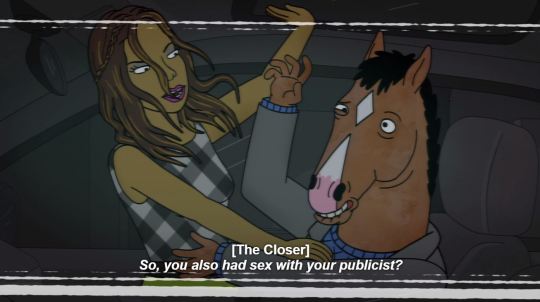
“It’s so sad that when you know someone for who they are, it ruins them.”
Bojack Horseman also begins a relationship with his publicist, Ana Spanakopita, which he describes as “complicated.” Although they have sex and she controls nearly every aspect of his life, Bojack knows next to nothing about her. When she refuses to divulge information, Bojack decides to follow her home, an obvious invasion of privacy. He thought he had something real with her, but he just projected his own feelings onto her at a time when he needed comfort. The crux of their relationship is about control and power.
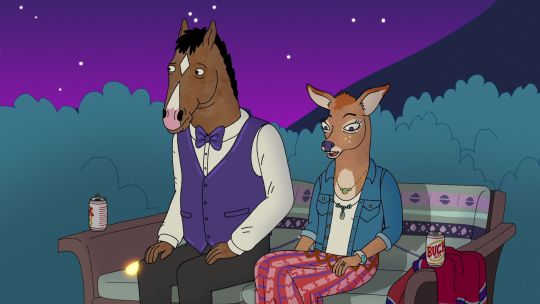
Bojack liked Charlotte because he was in a dark place. Charlotte was both mentally and physically outside of the LA bubble. He needed to escape from the "tar pit". She was also someone from his past; a happier time. He did have a genuine connection with Charlotte but it was a long time ago, before he was famous, and he's been clinging on to it ever since.
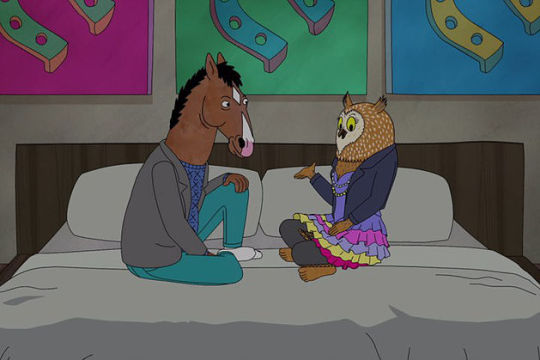
Wanda is one of the few people who remembers Bojack with any sense of fondness. One of the major reasons he liked her was because she didn't know about his bad traits. They break up after he threatens to auto-erotically asphyxiate himself if she doesn’t confess her love for him.

Diane and Bojack have a friendship framed by Bojack’s jealousy and intense dislike for Mr. Peanutbutter. They meet when Diane is assigned to ghost write his biography. Because it is her job to get to know the real Bojack, he quickly develops strong feelings for her. From early on in season one we know that Bojack is in love with her, as suggested by Princess Carolyn and Mr. Peanutbutter on numerous occasions.
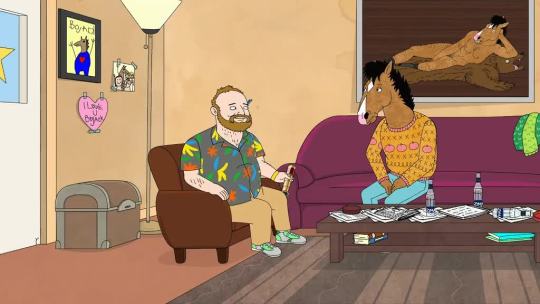
Bojack also has a corrupted relationship with his mother and his ex-best friend, Herb.
3. identity disturbance: markedly and persistently unstable self image or sense of self

Who are you? Most people are familiar with identity disturbances, having experienced at least one themselves, usually during adolescence. People with borderline personality disorder experience identity disturbance and need for people to like and approve of them.
youtube
Bojack is constantly unsure about his own skills, personality traits, and moral compass. In the first episode of the show when he “finds out” Princess Carolyn has other clients he asks her, “What other clients? Are they more talented than me?” His self-esteem teeters between inflated and nonexistent. Because Bojack does not know how to validate himself, he seeks external validation from others in order to reaffirm his identity.

In season 2, episode 2, Bojack decides that adopting an upbeat attitude will change his life. Issues with Bojack’s identity surface in his obsession with watching old episodes of Horsin’ Around. When he agrees to let Sarah Lynn live with him in the very same episode, he does so under the misguided idea that it will make him feel less alone and fix his problems - like it works on Horsin’ Around. He proceeds to spend the episode behaving like he’s on an episode of Horsin’ Around, including a total change of demeanor. Todd explains to him that this isn’t a TV show, this is real life, but Bojack refuses to see outside of his delusions.
More horse than a man, or more man than a horse?

At the end of season 3, Bojack watches a herd of horses running across the open plains. This brings us full circle to the ending theme song which has lyrics that read:
It's been so long
I don't think I'm gonna last
I guess I'll just try
And make you understand
That I'm more horse than a man
Or I'm more man than a horse
This can be interpreted one of two ways. The first suggests that Bojack must make the choice between being a man and a coward - given that horses naturally flee from perceived danger. At one point Bojack even confesses, “I’ve been running my entire life.” He is coming to a crossroads where he must decide if he will continue to run from his problems or face them head on.
The interpretation that I subscribe to is a bit more literal. Rather than a metaphor for cowardice, Bojack is wondering if his unhappiness comes him living the life of a man, rather than what comes naturally - being a horse. His crippling childhood never allowed him to internalize any ideas about worth and self-image, so he instead relies on more “measurable” external factors like talent, wealth, or relationships.
4. impulsivity in at least two areas that are potentially self-damaging (e.g., spending, sex, substance abuse, reckless driving, binge eating). Note: Do not include suicidal or self-mutilating behavior covered in Criterion 5.
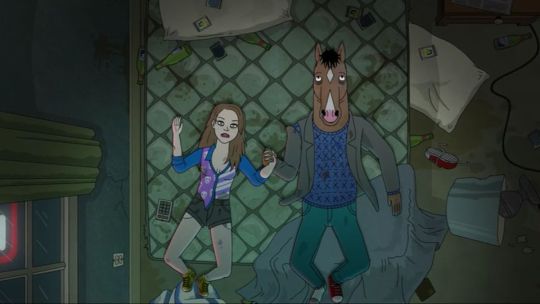
Bojack easily fits all the types of listed self-damaging behaviors, as evidenced below. He’s been known to modify his body, abuse drugs/alcohol, spend and drive recklessly, behave sexually inappropriate, and binge eat.
Spending: We know immediately that he is prone to throwing parties and spending tons of money to make them a hit. Even though he explicitly tells Todd he won’t buy a cotton candy machine (because he can’t control himself around them) he buys one anyway.

Sex is often used as a tool in Bojack’s self-destruction. A prime example of this is when Bojack has sex with Todd’s girlfriend, a move he knows would destroy Todd and effectively ruin his relationship with Bojack. Even worse, in "Escape From L.A." Bojack nearly sleeps with Charlotte’s daughter, Penny, then seventeen years old. He thought he might be able to have something with Penny, but that was just a failed attempt to replicate what he previously had with Charlotte. All ambiguity is gone by the end of season 3, as BoJack explicitly states he intended to sleep with Penny, even if he wishes that he was better than that.
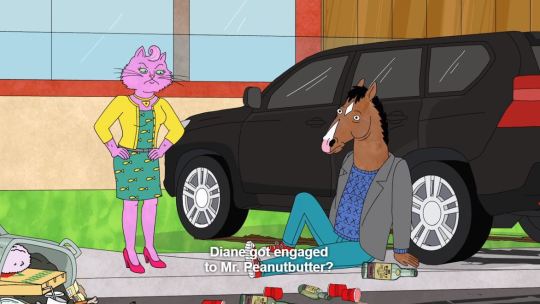
Substance abuse (alcoholism) becomes clear in the first episode of the show, but it is reinforced time and time again. After Diane gets engaged to Mr. Peanutbutter, Bojack goes on a two week bender and ends up on Princess Carolyn's front lawn. A “bender” is the status of being bent for more than a day. Usually results in loss of memory, money, strange tattoos, and other things you'll have a hell of a time explaining. The most apparent example of this is during season 3, episode 3, when Bojack and Sarah Lynn take a ton of drugs and try to make amends.

Reckless driving is merely the backdrop to their downward spiral. They drink and drive, on top of ingesting a variety of drugs.

Binge eating is one of the newly recognized eating disorders. Most of us have done it at least once or twice. However, it can become a serious problem when someone has recurrent episodes of eating large quantities of food. This “binge” is usually accompanied by feelings of shame and guilt, or a loss of control.
We are introduced to this behavior in the first episode of the show, when Bojack breaks up with Princess Carolyn and eats nine baskets of bread. Afterward in the car, he asks Princess Carolyn if she thinks he looks chubby. When Bojack finishes telling the story to Todd, he’s still focused on intense feelings of guilt over prospective weight gain and concern about his body image, while simultaneously inferring he just ate an entire pizza.
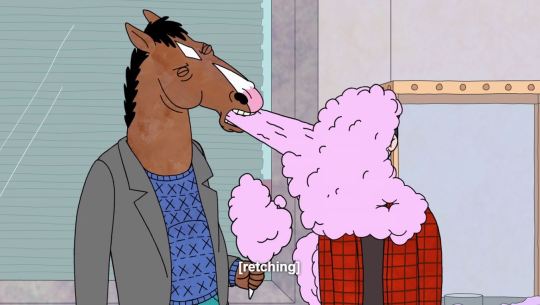
The food is often eaten very quickly, for reasons related to stress, and usually to the point of discomfort, or even pain. In the same episode Bojack admits to standing in a corner alone, eating cotton candy to the point of puking at Todd’s last party. (This comes full back around by the end of the episode, where he is shown doing the exact same thing.)
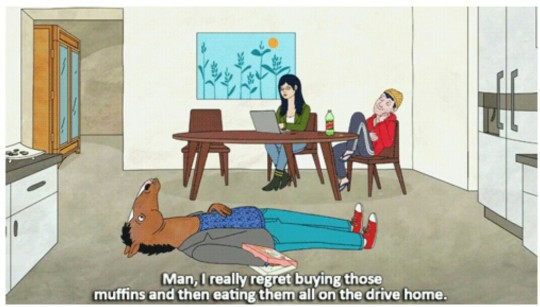
This behavior recurs again and again, such as in season 2 episode 2 when Bojack buys muffins just to prove a point and then eats all of them on the ride home. In the third season, he belches again after raiding Diane and Mr. Peanutbutter's fridge. These episodes of gluttony can be seen as yet more failed attempts to handle his inner turmoil resulting in his appearing inconsiderate and repulsive to others.
5. recurrent suicidal behavior, gestures, or threats, or self-mutilating behavior
Having BPD often makes suicide look like a good solution when it’s not. This suicidality can appear at different times, in different ways, and for drastically different reasons. For example, some may use suicide and/or self-harm as an “escape rope” from chronic overwhelming emotions, while others may threaten suicide and/or self-harm as a means to exert control or manipulate others.
“So if you don’t mind, as long as you don’t love me, I’m going to step into this noose.”

In season 2, episode 2, Bojack casually threatens to auto-erotic asphyxiate himself in order to make Wanda admit she loves him. While it is hard to say whether or not Bojack was serious, this behavior is not uncommon among people with borderline personality disorder. Suicidal gestures and threats are often used as a way to exert control when an individual feels powerless or overwhelmed by emotions. The desire for control is not necessarily malicious in nature. The person threatening or attempting the behavior almost always feels a genuine sense of desperation.
6. affective instability due to a marked reactivity of mood (e.g., intense episodic dysphoria, irritability, or anxiety usually lasting a few hours and only rarely more than a few days)
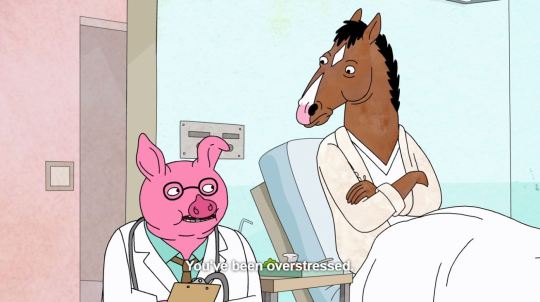
In the first episode, Bojack has what a doctor later describes as a “minor anxiety attack” when he finds himself thinking that maybe he is “just a washed up has-been.” The panic attack is so bad he ends up in the hospital. When Princess Carolyn suggests Bojack call the ghostwriter because the book deal is stressing him he responds, “You want me to call this woman on the phone?” and proceeds to have another anxiety attack.
7. chronic feelings of emptiness
Imagine being full of empty. Bored. All the time. People with BPD feel an acute sense of nothingness that diminishes their worth outside of relationships with others. This feeling can be turned inward and result in self-loathing, panic attacks, self-harm, etc.

Bojack dissociates pretty regularly - disconnecting almost entirely from his environment, and at times, his emotions. The opening of the show includes Bojack’s bust, superimposed over different scenes. His face is sad, eyes empty and lifeless. He appears totally indifferent and unresponsive.
He is also shown having flashbacks during bouts of dissociation, such as Diane points out in season 1, episode 2 when she asks him about his childhood. “You just sat here for five minutes in silence and then said, ‘Uneventful.’”
Mr. Peanutbutter: All I ever wanted was to be your friend. And you treat me like a big joke. You think I don't notice? Why don't you like me?
BoJack: Mr. Peanutbutter.
Mr. Peanutbutter: No, tell me.
BoJack: Because I'm jealous.
Mr. Peanutbutter: Oh. Of what? Diane?
BoJack: No. Of everything. Everything comes so easy for you.
Mr. Peanutbutter: Oh, and it doesn't for you? You're a millionaire movie star with a girlfriend who loves you, acting in your dream movie. What more do you want? What else could the universe possibly owe you?
BoJack: I want to feel good about myself. The way you do. And I don't know how. I don't know if I can. I'm sorry, Mr. Peanutbutter. I can't tell you how sorry I am.
8. inappropriate, intense anger or difficulty controlling anger (e.g., frequent displays of temper, constant anger, recurrent physical fights)

Bojack experiences intense anger in both big and small ways. Small events like a stray curly fry being among their normal fries is enough to set him off, or receiving repeated calls from an unknown number.
Other Borderline Behaviors:
Oversharing is the act of prematurely revealing personal information. This behavior can occur for a couple of reasons. First and foremost, it can be used as a “test.” If the person responds nonjudgmentally, they have passed, assuring the Borderline that it is safe to get to know them. Other reasons for this behavior include few boundaries, a desire for instant intimacy, impulsivity, and a compulsion to confess their “sins.”
In the second episode of season 1, after only just meeting Diane at the party, he confides in her that he uses horse tranquilizers recreationally, and that he just takes a small does to help him sleep at night, and a much, much larger dose to get him through the day. When Diane reads this back to him from an email, he is visibly embarrassed.
“You ruined me Bojack.” A Childhood of Chronic Invalidation, Neglect, & Abuse
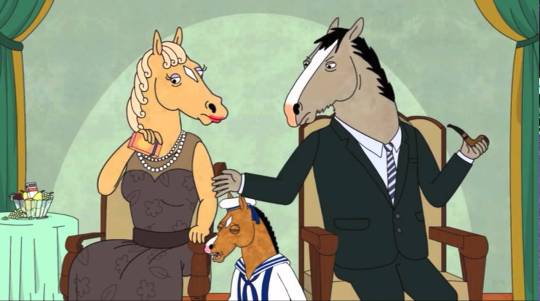
Borderline personality disorder develops due to a combination of genetic predisposition and life experiences (nature and nurture.) Still, most people that experience trauma, chronic invalidation, and neglect, do not usually develop borderline personality disorder. However, most people with borderline personality disorder have experienced a childhood full of chronic invalidation.
Emotional invalidation is when a person's thoughts and feelings are rejected, ignored, or judged. Children who are regularly invalidated by their parents which learn to distrust their emotions, a precursor to BPD. Despite the chronic invalidation and abuse revealed via Bojack’s memories, he describes his childhood as “normal” (”Bojack Hates the Troops”) This is because Bojack, like many people in the real world, does not realize what constitutes as abuse, especially from his parents.
When he gives his father a father’s day card, his father criticizes him for taking the easy way out and not trying his best. He also slaps him hard in the face when he answers “wrong.” This type of abuse goes on and on, such as his father making him build his own tree house before tearing it down. His mother is equally as abusive in different ways, utilizing gaslighting and other methods.
Bojack begins showing signs of depression in early childhood. In "Yesterdayland,” he sends a letter into a television show that reads:
I am a good kid and I like to play, and I like to go to school, but sometimes I get sad. What do you do when you get sad? How do you not get sad?
His parents walk in while Bojack is watching TV and fight in earshot, yelling loudly and smashing dishware. His mother soon enters the room, angry and critical. She explains to her young son that before he was born, she was beautiful. She tells him to make up for all the damage he’s done, he better grow up to be something great. This plants the seed of Bojack’s deep-rooted need for perfectionism.
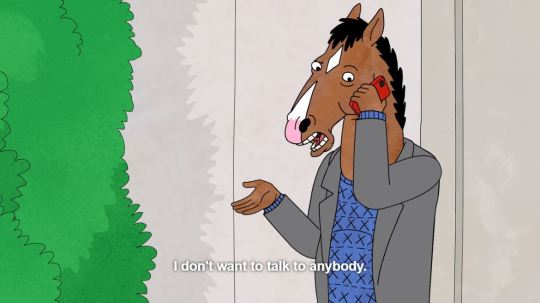
In “Stop the Presses,” Bojack maintains that he doesn’t want to talk to anyone, he just wants control over his own life. Many people with BPD don’t get the help they deserve due to a lack of knowledge or stigma surrounding mental health issues. Bojack Horseman is one of them. Don’t be like Bojack Horseman. If you relate to some or most of these listed criteria, get your brainhead checked by a real professional.
599 notes
·
View notes